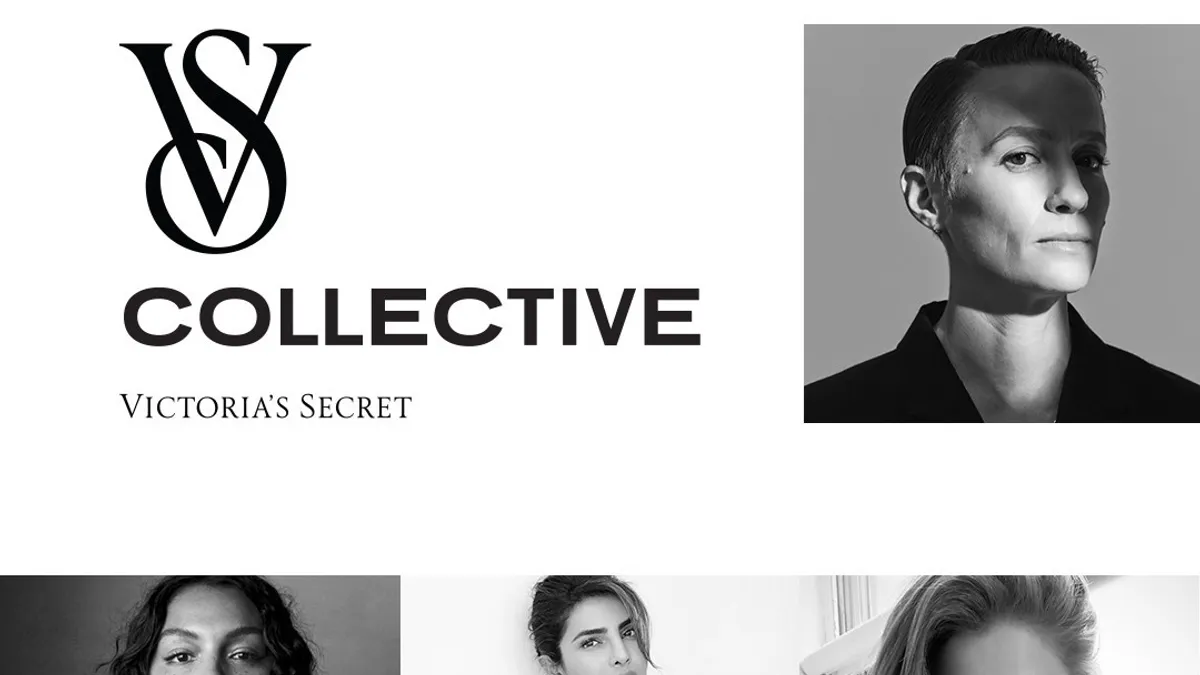It took a while and steady losses in market share. But, ahead of its departure from L Brands — its home for four decades and the incubator of its once hugely successful, man-pleasing marketing campaigns — Victoria's Secret has let go of its angels.
They are being replaced with a group of influential and powerful women, who will help shape the brand's merchandising and messaging, L Brands said in a press release Wednesday. The first to join this "VS Collective" are soccer star and LGBTQIA+ activist Megan Rapinoe; champion free skier Eileen Gu; actor Priyanka Chopra Jonas; Sudanese refugee, model and activist Adut Akech; GirlGaze founder Amanda de Cadenet; model and "body advocate" Paloma Elsesser; and openly transgender activist, model and actor Valentina Sampaio.
The same day the conglomerate announced a board slate that will include just one man — Victoria's Secret CEO Martin Waters — and commence work once the brand has been spun off into a separate company later this year. These developments are essential and require follow-through to succeed, according to Thomai Serdari, professor of luxury marketing and branding at New York University's Stern School of Business.
"This is the right direction for VS if they want to appeal to younger customers and GenZ consumers who have a more inclusive definition of what sexy is and what it can be," she said by email. "For the new brand image to stick the company will have to be constant and consistent in its messaging and visuals with campaigns that continue beyond the present VS Collective."
About time
For years, several analysts and investors have been pushing Victoria's Secret to pivot this way, but change has been incremental and slow.
That allowed several brands (including Rihanna's Fenty, American Eagle's Aerie and several DTC labels) to not only take market share, but also needle the brand with their own feminist critiques and empowerment-based messaging.
Meanwhile, the lingerie market, set to reach $250 billion globally by next year, according to retail analytics firm Edited, has moved on from the male gaze. The strong preferences of Gen Z consumers now dictate comfort, inclusivity (which includes sizing and nude shades) and sexiness that embraces all body shapes and sizes, according to Edited research.
On a call with analysts last month, Waters signaled that the brand has received the message. "[Victoria's Secret is] moving from a position of, frankly, being irrelevant to being relevant, to being for him to for her, being more inclusive rather than exclusive, and the customer is really noticing it and voting with her wallet, so that's great," he said, according to a Seeking Alpha transcript.
Speaking to the New York Times Wednesday, Waters said it was clear that L Brands "needed to change this brand for a long time, we just haven't had the control of the company to be able to do it." L Brands founder Les Wexner, who had a personal and financial relationship with disgraced financier and convicted sex offender Jeffrey Epstein, exited as CEO last year and left the board earlier this year, ceding control of the company entirely after six decades.
But is it too little, too late?
"I don't think it's too late, I think it's about time," Lee Peterson, executive vice president of thought leadership and marketing at WD Partners, and a longtime merchant at L Brands, said via email. "This will be a grand experiment on branding, along the lines of the Target shift in the late 90s and now the Gap attempt with Yeezy. Can a massive, center-of-the-bell-curve brand like VS turn on a relative dime and say, 'Hey everyone, we're not that anymore, we're this'? We're about to find out, although it will take years to either prove itself, or peter out."
The risks
Despite its now problematic reputation, Victoria's Secret remains a money-maker, taking in $5.4 billion in sales last year, even with stores closed for months in most areas due to the pandemic. Any kind of major change represents some level of risk to those sales.
"There is, for sure, a large segment of the population that will be offended by the new image (even tamer transformations may offend the consumer who is emotionally bonded with a specific brand) and may abandon the brand," Serdari said. "In that sense, the rebranding comes with risk. However, this can be managed, especially if we take into account that this will not be the first brand that tries to sell inclusivity, fourth-wave feminism, and female empowerment via sexy lingerie. FENTY has already done that and done [it] successfully."
Tension could also emerge between what will be a Victoria's Secret board dominated by executives from corporate America and the more activist-minded members of the VS Collective, Peterson said.
While the former honchos at L Brands, including Wexner and longtime marketing chief Edward Razek, may have stubbornly stuck to what became a losing marketing ploy, they also "really understood how to sell a LOT of stuff to a LOT of people," Peterson said, adding that it's not clear what real power the collective has, or how it will be wielded. How involved the collective might be in merchandising decisions could also impact sales, he said.
Fundamentally, though, Victoria's Secret must shift the power to its customers, Serdari said.
"In other words, I don't see female empowerment and sexiness as opposites," she said. "On the contrary, the two can coexist but the underlying message needs to be clear: Our lingerie is sexy in the way *you (the wearer) want to be."
Clarification: The story has been updated to clarify Lee Peterson's comments regarding how merchandising decisions might impact sales.

















